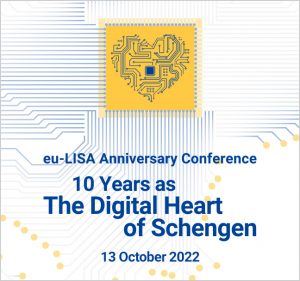Krum Garkov (Executive Director, eu-LISA)

Krum has more than 20 years of cross-cultural experiences spanning the public and private sectors.
He took up the Executive Director post at eu-LISA in November 2012 and has lead the Agency with the vision to promote information and communication technologies as a key success factor for integrated border management and law enforcement at the EU level. He sees eu-LISA’s mission in helping Members States in their efforts for safer Europe and ensuring the continuous and stable service delivery to them in the ever evolving digital environment.
Before eu-LISA, he was the Operations Director for Experian Group Ltd., a leading global information provider serving the finance industry. Prior to that, Krum was Program Manager at Hewlett-Packard. He has also served the National Revenue Agency as well as the Centre for Mass Privatization in Bulgaria. Krum holds an M. Sc. in Computer Technologies (Varna), an MBA in Information Systems (Stevens Institute of Technology, New Jersey) and has received executive education from London School of Business & Finance with an MBA in Management Consulting.
Fabrice Leggeri (Executive Director, Frontex)
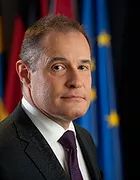
Fabrice Leggeri, has been Executive Director of Frontex, the European Border and Coast Guard Agency, since 16 January 2015, overseeing an unprecedented period of expansion at the Agency.
He joined Frontex from the French Ministry of Interior, where he ran the Division on Irregular Migration, with key responsibilities arising from Schengen-related public policies and illegal immigration. Earlier, he served as Head of the Unit dealing with cross border traffic, frontiers and visas.
Mr Leggeri has worked extensively in the area of migration and international law. Following his first stint at the Ministry of Interior, he worked as national expert at the European Commission in 2000-2003, where he contributed to drafting the Commission paper that led to the creation of Frontex.
He graduated from the École nationale d’administration (ÉNA), École normale supérieure (ENS) and L’Institut d’études politiques de Paris.
Richard Ares Baumgartner (Senior Strategic Advisor, Frontex)

Richard has been working for almost 20 years in the field of EU Home Affairs Policies. After a first experience as administrator at the Schengen Secretariat and later at the EU Council Secretariat General (1997-1999) he was recruited by the European Commission, DG JLS, (1999 – 2007) as a Policy Officer at a time when the EC was given important new powers in this field.
Richard contributed to the implementation of Commission large-scale IT projects such as Eurodac (Asylum), Visa Information System and Schengen Information System II. He was also responsible for a Community Programme (ARGO) promoting cooperation between national asylum, immigration, border control and visa authorities. He also worked as legal/policy officer on illegal immigration.
He joined the Frontex Agency in July 2007 and became Head of the External Relations EU/Intl Org Team responsible for Inter-institutional relations and inter-agency cooperation in fields such as border/migration management, asylum, fundamental rights, maritime affairs, police and customs cooperation. He has joined in 2016 the Cabinet of Frontex Executive Director as EU Affairs Strategic Advisor.
Richard has a master degree in law after finishing his studies at the University of Santiago de Compostela (Spain) and Passau (Germany) and completed it with internships at two international law firms in Madrid. He has also acquired a solid background in international relations and trade after preparing the competition for the Spanish Diplomatic Corps and working at the Spanish Chamber of Commerce in Miami (USA).
Laurent Beslay (Scientific Project Leader on Law enforcement technologies, EC Joint Research Centre)
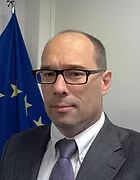
Laurent Beslay is a European Commission Official at Joint Research Centre, within the Directorate on Space, Security and Migration and works as Scientific Project Leader on Law enforcement technologies. He manages research activities on cybercrime and cyber-dependent organised crime, biometric systems and privacy safeguards. From 2004 to 2011, he was the scientific advisor of the European Data Protection Supervisor coordinating the activities on security and technology and. He previously worked, for six years, for the JRC – Institute for Prospective Technological Studies as a PhD candidate (Electronic surveillance: benefits and risks for the EU) and as a project officer in the field of cyber-security.
Guido Brockmann (Head of Sector for Test and Integration Services, eu-LISA)

Guido works at the boundary between development and production in eu-LISA. As Head of Sector for Test and Integration Services, he leads the team responsible for the software quality assurance and integration of new users to the systems. The nature of these horizontal tasks see him involved in a multifold of business IT related projects and programs within eu-LISA, ensuring that they are executed to the highest standards. Within his portfolio of competencies he is specialized in applying different methodologies within medium-sized to large mission-critical projects.
Guido holds a M.A. in Political Sciences, Communications Research and International Law from the University Bonn, Germany. Fluent in five languages he is a certified Senior Project Manager with extensive experience testing and deploying large scale IT systems in the Public Sector.
Prior to joining eu-LISA he worked for the European Research Council EA, the Directorate General for Informatics of the European Commission as well as in private enterprise.
for Test and Integration Services, he leads the team responsible for the software quality assurance and integration of new users to the systems. The nature of these horizontal tasks see him involved in a multifold of business IT related projects and programs within eu-LISA, ensuring that they are executed to the highest standards. Within his portfolio of competencies he is specialized in applying different methodologies within medium-sized to large mission-critical projects.
Guido holds a M.A. in Political Sciences, Communications Research and International Law from the University Bonn, Germany. Fluent in five languages he is a certified Senior Project Manager with extensive experience testing and deploying large scale IT systems in the Public Sector.
Prior to joining eu-LISA he worked for the European Research Council EA, the Directorate General for Informatics of the European Commission as well as in private enterprise.
Ciarán Carolan (Head of the External Affairs and Capacity Building Sector, eu-LISA)
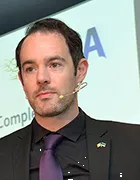
Ciarán works at the interface of policy, research and technological evolution. His principle role at eu-LISA involves the monitoring of relevant technological developments in order to ensure that the Agency’s systems are continuously developed in line with advancements in the field. He is also strongly involved in technical and operational projects to ensure that they are carried out according to the state-of-the-art. His reports on technology moderating are also published in order to feed general discussions on technologies in the JHA area.
Mr Carolan currently chairs eu-LISA’s internal Task Force on Interoperability, coordinating the Agency’s involvement in and input to the European High Level Expert Group and its subgroups examining current system evolution, development of new large-scale IT systems and systems interoperability. He is also involved in several technical working groups in the Justice and Home Affairs domain.
Ciarán has B.Sc and PhD qualifications from Trinity College Dublin. Prior to joining eu-LISA, he worked on software design and development as well as IT system administration at the European Molecular Biology Laboratory (EMBL) in Hamburg, Germany.
Marc-André Daigle (Director, Strategic Initiatives and GCMS Coordination, Immigration, Refugees and Citizenship Canada)

Marc-André Daigle is the Director of the Strategic Initiatives and GCMS Coordination division within the Immigration Program Guidance branch at Immigration, Refugees and Citizenship Canada. He is mainly responsible for managing the Electronic Travel Authorization, including implementation and operational aspects. He hosted the European Union delegation visit in fall 2017 and has been the main Canadian contact point since, and will be leading the Canadian delegation in Warsaw and Tallinn. He has been with the Department for 10 years in various roles in immigration program management (such as asylum and visitor programs), IM/IT and project management.
Luis de Eusebio Ramos (Deputy Executive Director, EUROPOL)
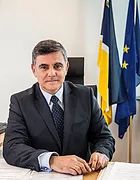
Mr de Eusebio was born in 1962 in Madrid, Spain.
In 1988 he graduated with Honours from the Polytechnic University of Madrid as a Telecommunications Engineer. He also holds several masters and certifications in ICT and Public Management.
He has worked in the ICT industry since 1987. His first jobs were in the private sector as an electronic warfare engineer and afterwards as a radio communications systems engineer.
In 1992 he became a Member of the Senior Body of State Civil Administrators and began working for the Spanish Government in the Ministry of Industry.
From 1994 he began what would become a constant theme in his career: the modernisation of administrative processes by means of large ICT projects involving human resources (HR) and financial management. He was appointed to positions in the Ministry of Foreign Affairs (1994), Ministry of Health (1995) and the Telecommunications Market Agency (1999).
Between 2002 and 2006 he was Deputy Director of the Ministry of Public Administration where he was responsible for the overall e-Government strategy of the Spanish Administration and the coordination of all Spanish Ministries. He also contributed to some major ICT projects.
In 2006, Mr de Eusebio was promoted to the position of Chief Information Officer of the Road Traffic National Agency in the Ministry of Interior, working in close cooperation with both the Policía Nacional and the Guardia Civil. He was responsible for streamlining all the services of the Agency and their delivery to millions of citizens.
Mr de Eusebio was appointed Executive Advisor to the General Director of the Spanish National Police in 2012. In this role he was responsible for planning and evaluating the National Police Information and Communications systems as well as for their implementation and evaluation under the ICT part of the National Police Strategic Plan 2013-2016. He also oversaw the participation of the National Police in a number of EU security-related projects.
Mr de Eusebio took up the position of Deputy Director of Europol (now Deputy Executive Director) as Head of the Capabilities Department (now – Directorate) in August 2015, where he directly manages staff from ICT, HR and finance.
Mr de Eusebio speaks Spanish and English; his interests include classical music and photography.
Mike Fandler (Head of Unit IV/2, Austrian Federal Ministry of Interior)

Mike Fandler has been working for the Ministry of Interior since finishing his studies in law in 1996. After starting as legal and financial expert during the first Austrian Presidency within the Schengen-Cooperation and quite a time as Delegate in various European Groups, he was Head of the Strategic Unit in the IT-Department of the Ministry of Interior. Currently he is Head of the IT-Department of the Ministry of Interior and Austrian Member of the Management Board of EU-LISA.
Mike Fandler is married and a father of two children. He is a passionate runner and traceur, likes literature and arts of any kind.
Pedro Figueira ( IT Expert, Portuguese Immigration and Borders Service – SEF)

Pedro Figueira is working for the Portuguese Immigration and Borders Service (SEF) as a Senior IT Expert and Technical Project Manager for the last 14 years. With extensive expertise on the national entry/exit system, he has had a very active contribution on border related projects such as the 2015 Smart Borders Pilot, ABC4EU and RAPID4ALL projects.
In addition to border matters, he is also a recognized Schengen Information System specialist, having participated decisively in the planning and operationalization of projects such as SISone4ALL and SISII, as well as participating in multiple Schengen Evaluation missions as an expert.
In the recent years, he has also actively participated in the discussions on Commission proposals from which the new information systems (Entry/Exit System, European Travel Information and Authorisation System and interoperability) will emerge as well as the renewal of the legal bases of the Schengen Information System.
Pedro currently works in Lisbon, is married, father of two wonderful children, and loves a good hot beach day on the shores of Atlantic.
Nicolas Goniak (Advisor, IT, European and international affairs, French Ministry of the Interior)

After graduating from Ecole Centrale Paris as an engineer in real-time computing, he founded a software company in medical imaging, resold lately. He headed towards the security industry by joining Sagem, now Idemia, where he led hardware and software product lines ranging from IT security to national ID cards, all combining a high level of cryptography and biometrics.
Nicolas is working for the French Ministry of Interior for nearly 6 years, where, as director for border control applications, led smart Borders projects that paved the way to the entry/exit regulation, set up, at the national level, a sound technical and regulatory environement, and build strong partnership with airports which led them to the successful rollout of e-gates in French airports, and, lately, to the move to facial recognition.
He is now the voice of the ministry of interior’s services point of view in the matter of European IT systems in the challenging context of the regulatory move towards an effective and genuine Security Union. Still with a strong risk/security-management oriented set of mind, he got recently closer to the concerns of the operational services (border, law enforcement, migration, police, visa, …), of the carriers, and of the citizen, by leading the national impact assessment study on the effective outcome of the latest regulation on visa, entry-exit, travel authorization, criminal records, police cooperation, and interoperability.
Owe Langfeldt (Legal Officer and Head of Prior Checks and Consultations, Supervision and Enforcement Unit, EDPS)

Owe works as a Legal Officer and Head of Prior Checks and Consultations in the Supervision and Enforcement Unit of the EDPS, the supervisory authority for the processing of personal data by EU institutions, bodies and agencies.
In that role, he has followed numerous files in the Area of Freedom, Security and Justice both from a policy perspective and in the EDPS’ supervisory role. He also represents the EDPS in the supervision coordination groups for SIS, VIS and Eurodac.
Pasi Nokelainen (System Manager for Border Checks, Finnish Border Guard)

Pasi Nokelainen has worked for the Finnish Border Guard since 1992. In his current position since June 2010, as a System Manager for Border checks at the Technical Division of the Finnish Border Guard Headquarters he is responsible for the technical development of IT-systems and implementation of border check technology. During 2007-2010 Mr. Nokelainen worked as a seconded national expert to the unit for Large-scale IT-systems and Biometrics in the European Commission, where he contributed to the establishment of the Visa Information System and in particular to the first steps of the technical feasibility of the Entry-Exit system. In addition to his current activities connected to the implementation of the Smart Borders package and biometrics at border checks, his prior work history entails activities connected to prevention of document fraud, border check operational guidance and contribution to the Frontex ABC work on ABC guidelines.
Olivier Onidi (Deputy Director General of the Directorate-General Migration and Home Affairs, European Commission)
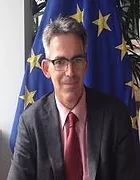
Since 1st May 2016 Olivier Onidi is Deputy Director General of the Directorate-General Migration and Home Affairs at the European Commission with particular responsibility over security. In this capacity, he oversees the activities in the fields of terrorism and violent extremism, organized crime, cybersecurity, information systems and innovation. He also heads the Secretariat of the European Commission’s Task Force for the Security Union.
His last assignment was Deputy Director General of Directorate-General Migration and Home Affairs, with the specific task to coordinate the Commission-wide work related to the Central Mediterranean Route in the context of the refugees crisis.
Previously, he was Director for the “European Mobility Network” within Directorate-General for Mobility and Transport, responsible for the development of the Trans-European Transport network infrastructure, the implementation of the Connecting Europe Facility funding instrument and the creation of a Single European Rail area. Prior to this, he was Director for Innovative and Sustainable Mobility, in charge of transport security, clean and urban transport, intelligent transport systems and road safety.
He also worked as Deputy Head of Cabinet of the Energy Commissioner, Mr Günther H. Oettinger, as Head of Unit for air transport services, aviation safety and environment and Head of the satellite navigation system programme – GALILEO.
His first posts in the Commission were assistant to Directors-General in the areas of Energy & Transport, External Relations, the Secretariat General and in the cabinet of the Commissioner for Research and Development, innovation, education and training.
Before joining the Commission, he worked as adviser to the Executive Committee of Belgacom and as public policy Manager at American Express International.
Mr Onidi holds Master degrees in International Economics, in European Studies and in Business Administration.
Fares Rahmun (Technical Project Manager “EU Smart Borders” & “Border Control of the Future” Federal Office of Administration (BVA), Germany)

Fares Rahmun is working for the German Federal Office of Administration (BVA) as a Senior IT Project Manager for Government Information Technology Solutions.
After having successfully supervised the national technical integration of the European Visa Information System (VIS) he now is in charge at BVA of the integration of the upcoming Entry/Exit System (EES) and the European Travel Information and Authorisation System (ETIAS). In addition he leads the national programme “Border Control of the Future” at BVA, acting as a strong partner to the German Federal Police for the upcoming challenges in the area of border management.
Fares conducted several national and European pilot projects and has participated in various expert groups dealing with biometrics, visa and border management. Here he combines his knowledge of large scale IT-applications and identity management solutions with profound knowledge of the relevant business processes.
Fares holds a degree of M.Sc. in Business Information Systems from the University of Applied Sciences in Cologne.
Rob Rozenburg (Head of Information Systems for Borders and Security Unit, European Commission, DG Migration and Home Affairs)

Rob Rozenburg studied Political Science and International Law at the University of Amsterdam. After an initial career in a Dutch NGO and in the private sector, he joined the European Commission in 1994, where he worked in several positions in the area of trade, external relations, development and home affairs.
Mr. Rozenburg is currently the Head of Unit ‘Information Systems for Borders and Security’ in the Commission’s Directorate-General for Migration and Home Affairs. In that capacity he is responsible for, inter alia, the SIS, the preparation of EES and ETIAS, the Commission’s relations with eu-LISA and the interoperability project, including the preparation of the Commission’s legislative proposals on this subject.
Theofanis Syrigos (Chairperson of the EES AG, Customer Relationship Officer, eu-LISA)
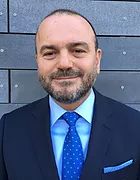
Fanis is an ICT engineer with more than 20 years of experience and insight in the area of Security, Justice and Home Affairs, in particular in the Schengen procedures and the associated technologies used in the Diplomatic and Consular missions of the Member States. He served in the various Diplomatic missions of this country and appointed as Head of the Schengen ICT sector of the Hellenic Ministry of Foreign Affairs. He was then seconded as National Expert to DG Home Affairs of the European Commission in the Unit responsible for the implementation of the European Large Scale IT Systems VIS / BMS / VIS Mail / SIS and Eurodac. He is currently employed by eu-LISA as Customer Relationship Officer in the Border Management Systems Sector and is appointed as Chairperson of the EES AG.
Sirra Toivonen (M. Sc. (Tech), Senior Scientist at the VTT Technical Research Centre, Finland)

Sirra Toivonen is a Senior Scientist at the VTT Technical Research Centre of Finland Ltd. She has worked at the Risk and Asset Management knowledge center since 1995. The research interests include border control and border management technologies, security management of global supply chains, human factors, product and system usability design and testing and value creation in security area product innovations. In 2013, she earned her certification as a Project Manager. Since 2009, Ms. Toivonen has been involved in a number of FP7 and H2020 EU projects in the area of border management and border technology development in both technical and managerial roles.
Michiel van der Veen (Chief Executive of the EAB)

Michiel is Chief Executive of the EAB and supports the ID community with Executive leadership and thought leadership in the field of digital ID & Biometrics. From 2000 onward, Michiel had several technical and leaderships roles in Philips Electronics, and received, in 2007, the Distinguished Employee Award. In 2008, Michiel founded priv-ID, an early innovator in biometric, digital identity and privacy-by-design. It later merged with GenKey in 2011, with Michiel appointed CEO. He has led GenKey through multiple stages of growth to become one of the most trusted brands in the market to provide Identity for Development.
In 2012 GenKey helped to deliver the world’s first digital ID solution for Ghana’s Presidential Elections. Since then, Michiel has been involved in many large-scale digital identity projects for governments and businesses, across Africa and Europe.
Michiel is a regular industry contributor, speaking about digital identity and biometric; along with future thinking about innovation and market trends. Currently, he is Chief Executive of the European Association for Biometrics (EAB), a non-profit and vendor neutral organisation focusing on the strategic ID challenges that Europe is facing. Michiel is also senior advisor Identity & Biometrics to World bank.
Michiel has a Ph.D from the Swiss Federal Institute of Technology (ETH Zurich) and further business education from Stanford.
Paolo Venturoni (Chief Executive Officer of the European Organization for Security – EOS)

EOS represents the European security industry and research community. EOS activities cover a number of security sectors, from the protection of public spaces to border management.
Paolo has twenty-five years of international experience in corporate development and public affairs having worked on a number of assignments for high-tech and telecommunications projects in Europe, North and South America.
Based in Brussels since 2002, Paolo has extensive experience of European Affairs with a focus on aerospace and security having been the director of the Brussels office of a major European aerospace concern and, from 2012 to 2015, a Vice Chairman of EOS Board of Directors.
Paolo is a member of the Board of the Columbia University Alumni Association of Belgium and a member of the Board of the European Cyber Security Organization (ECSO).
Paolo obtained his MBA from Columbia University in New York and graduated in Physics from the University of Rome.

